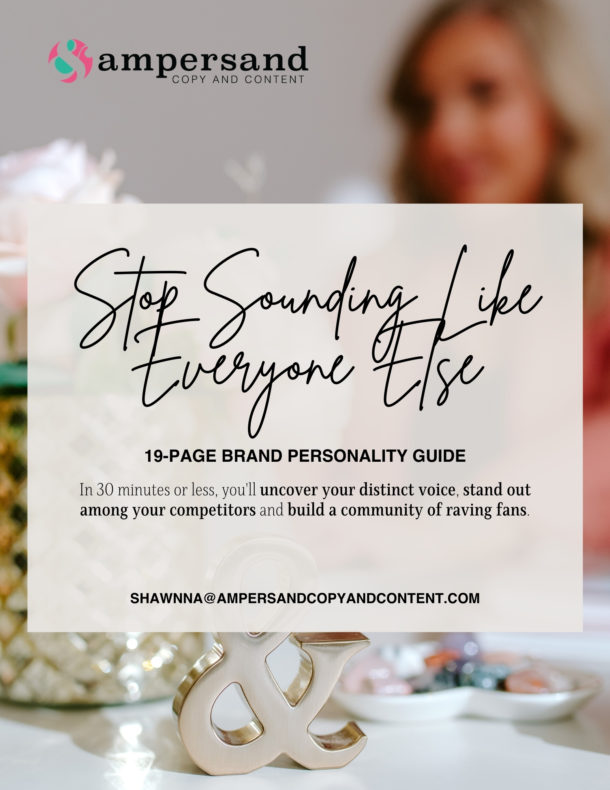I created my first magazine when I was seven years old. A little ditty about the go-to places you need to see in my hometown.
After that, I wrote chapter stories that always ended on a cliffhanger. In junior high, I wrote a story about reincarnation, which raised a few eyebrows. By high school, I recapped my favorite soaps and had set my sights on becoming the next Soap Opera Digest editor. Let’s just say I was inspired by a flair for the dramatic.
Even at a young age, my brain was obsessed with hooking a reader, infusing an authentic voice into story and looking for ways to stand out in a sea of sameness.
Which is why I was shocked to hear, repeatedly, that my passion for writing would never go beyond my imagination. And it sure as heck wouldn’t amount to a real job.
“What are you going to do with a writing degree?”
“There’s no money in writing. Unless you become an author and that’s really hard to do.”
“Writing isn’t a real job. Why don’t you become a veterinarian or a lawyer?”
The lack of encouragement was depressing. But not completely surprising, either. Rather than let the well-intended advice sway me, I decided to prove every single one of them wrong. (Stubborn Libra energy comin’ in hot.)
Why writing IS a real skill that EVERY business needs to have
Early on in my career I stumbled into marketing writing and it’s been my bread and butter now for almost 20 years. And it’s easy to see why persuasion writing has kept me steadily employed: every entrepreneur or company has to sell their products or services. Or they make no money. Period.
Unless your side hustle is just a hobby that helps you pass the time, you need to get your products or services into the hands of people who really need them.
So, how do you communicate that? Words. (Take that naysayers!)
Design or imagery is important, too, but more on that in a second. Every budding entrepreneur or small business owner needs to be able to use words to effectively communicate what it is that you do. And how that translates into what you can do for your ideal customer.
The only thing customers care about is their own personal needs. Harsh, but true. Their own personal challenges or desires are their main priorities. If you can’t resolve those pain points or problems, forget expecting them to pay for any of your products or services. I don’t care how experienced you are or what awards you’ve previously won for your expertise.
It has to answer the question of “what can this do for me?”
Your target audience is only interested in making their lives better and easier. Writing is the way you can communicate how your product or service does that. Specifically through every single piece of copy you create, whether it’s your website, email marketing, social media, etc.
Why the copy on your website is more important than the design
Yes, I said it. A beautiful, sexy, clean-looking website does not automatically guarantee a bunch of customers clambering to buy what you’re selling. I know what you’re thinking: in the movie, Field of Dreams, they said, “if you build it, they will come.” I know, I know.
Good design is only part of the equation.
It’s actually the copy that matters more than anything else on your website. The copy is what speaks to customers, explains your products and services and gives them a taste of your brand voice they can then relate to.
Unbounce analyzed data from 40,000 different landing pages and found the copy to be two times more influential to convert visitors coming to your website than the design.
Why the words you use for your business should always be clear over clever
It pains my overly dramatic young self to say this but the words you use in your business should always be clear and concise.
Even advertising giant David Ogilvy said it best, “If it doesn’t sell, it isn’t creative.”
A great pun, clever wordplay and witty comebacks are my favorite way to banter. Truly. But nothing should ever get in the way of selling your products and services.
You might see something that catches your eye and makes you chuckle, but more often than not that’s not the reason you buy.
Getting too clever can actually do the opposite and hurt your sales. Good copywriting is about having a conversation with your audience. It’s about getting to know their deepest desires and pain points and selling them on your story and how it solves their problems.
Your copy should never distract from this point. Or your creativity will backfire … fast.
Although copy is one of the most important pieces of the puzzle, it’s not the only one. When you combine effective copywriting with knowing your audience, having a strategy, analytics and good design, you’re bound to start seeing results.
Using words to market your products and services is a complex art, but rest assured, it can be learned. And made into a “real” job.
Need a website makeover? Expert content strategy? Killer blog posts? Or the full works? I’m ready when you are! Let’s jam together. Contact me at shawnna@ampersandcopyandcontent.com to get started.



Recent Comments